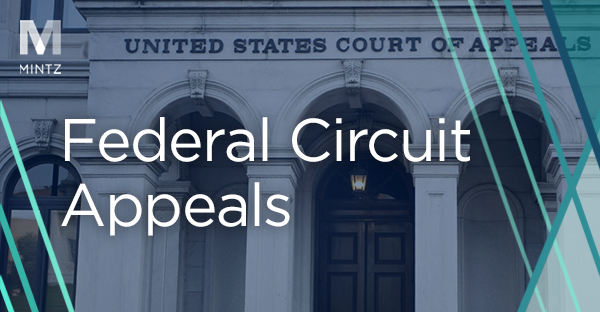
Intellectual Property
Viewpoints
Filter by:
DOJ Breaking with Big Tech Approach to SEPs
June 13, 2022 | Blog | By Daniel Weinger, Michael McNamara, Michael Renaud, James Thomson
On June 8, 2022, the DOJ, USPTO, and the National Institute of Standards and Technology (NIST) (collectively, the Agencies) issued a new statement on FRAND licensing (2022 Statement) providing no set policy regarding Standards Essential Patents (SEPs), which should inure to the benefit of patent owners. By issuing this statement and declining to adopt their 2021 Draft Policy (2021 Draft Policy), the Agencies effectively neutralized their policy on SEP licensing and provide no guidance to parties in SEP licensing discussions. Even with no guidance, however, the Agencies are reserving the right to police negotiations and prosecute opportunistic behavior by either side in a case-by-case basis, creating a circumstance where negotiators may not know if they are raising the Agencies’ ire. Though knowledge of the evolving multinational case law related to SEP license negotiation provides reasonable understanding of the necessary procedure.
No Harm, No Foul, and No Standing for Would-be SEP Implementer: 5th Circuit Changes Narrative on Patent “Hold Up”
March 3, 2022 | Blog | By Daniel Weinger, Michael Renaud, Bruce Sokler, James Thomson
Year in Review: The Most Popular IP Posts of 2021
January 5, 2022 | Blog | By Christina Sperry
Uncertain Seas for SEP Sailing In the US – New Guidance May Cause Stormy SEP Future
December 9, 2021 | | By Michael Renaud, Daniel Weinger, Bruce Sokler, James Thomson
Apple Backs Down: Commits to Take Global FRAND License to Avoid Exile from UK Market
November 5, 2021 | Blog | By Michael Renaud, James Wodarski, Matthew Galica
Optis Puts Apple’s Feet to the UK Fire: Commit to FRAND or Be Snuffed Out
October 4, 2021 | Blog | By Michael Renaud, Daniel Weinger, James Thomson
US Open for FRAND Business: The Fifth Circuit Vindicates Ericsson, Finding that Ericsson’s Offers were FRAND
September 3, 2021 | Blog | By Michael Renaud, Daniel Weinger, Meena Seralathan
Is This Seat Taken? A Chinese IP Court Proclaims Its Authority to Declare Global FRAND Terms
December 7, 2020 | Blog | By Michael Renaud, James Wodarski, Matthew Galica
The Art of An SEP War: A Chinese IP Court’s Recent Use of Anti-Suit Injunction Invites A Battle that It Likely Won’t Win
October 26, 2020 | Blog | By Michael Renaud, James Wodarski, Daniel Weinger
Another One Bites the Dust – N.D. Tex. Dismisses Antitrust Claims re FRAND Commitments with Prejudice
September 17, 2020 | Blog | By Michael Renaud, Joseph Miller
THE SEP WORLD IN BALANCE: UK Harmonizes with Germany’s Rejection of Implementer Hold Out
August 26, 2020 | Blog | By Michael Renaud, James Wodarski, Daniel Weinger, Matthew Galica
Ninth Circuit Reverses FTC Win in FTC v. Qualcomm, Finding No Antitrust Violations from Qualcomm’s Licensing of its Standard-Essential Patents
August 13, 2020 | Blog | By Rich Gervase, Joseph Miller , Michael Renaud, Tinny Song
IT TAKES TWO TO TANGO: The German Federal Supreme Court Acknowledges That Infringer Hold-Out is a Real Problem
July 16, 2020 | Blog | By Michael Renaud, James Wodarski, Matthew Galica
Actions Speak Louder Than Words: Germany’s Highest Court tells SEP implementers that simply saying that you are willing to license is not enough, and hold-out will not be tolerated
May 12, 2020 | Blog | By Michael Renaud, James Wodarski, Matthew Galica
Out with the old, and in with the new: joint policy statement and recent cases confirm that injunctive relief on standard-essential patents is available at the ITC
December 23, 2019 | Blog | By Michael Renaud, James Wodarski, Andrew DeVoogd, Matthew Galica
Key Considerations for Global SEP Litigation - Part 2
November 5, 2019 | Blog | By Michael Renaud, James Wodarski, Matthew Galica
Key Considerations for Global SEP Litigation - Part 1
October 30, 2019 | Blog | By Michael Renaud, James Wodarski, Matthew Galica
One Size Does Not Fit All When It Comes to Economic Theories Used to Determine Royalty Rates
July 1, 2019 | Blog | By Michael Renaud, James Wodarski, Matthew Galica
Score This One in Favor of Standard-Essential Patent Owners: Recent Decision Makes Satisfying FRAND Obligations Easier
June 5, 2019 | Blog | By Michael Renaud, James Wodarski, Matthew Galica
Another Shoe Drops in the Qualcomm Patent Licensing Saga
May 24, 2019 | Blog | By Michael Renaud, Bruce Sokler, Rich Gervase
Explore Other Viewpoints:
- Data Centers & Digital Infrastructure
- AI: The Washington Report
- Antitrust
- Appellate
- Arbitration, Mediation & Alternate Dispute Resolution
- Artificial Intelligence
- Awards
- Bankruptcy & Restructuring
- California Land Use
- Cannabis
- Class Action
- Complex Commercial Litigation
- Construction
- Consumer Product Safety
- Corporate Governance (ESG)
- Cross-Border Asset Recovery
- DEI Legal Developments
- Debt Financing
- Direct Investing (M&A)
- Diversity
- EB-5 Financing
- Education & Nonprofits
- Employment
- EnforceMintz
- Environmental (ESG)
- Environmental Enforcement Defense
- Environmental Law
- Environmental, Social, and Corporate Governance (ESG)
- FDA Regulatory
- False Claims Act
- Federal Circuit Appeals
- Financial Institution Litigation
- Government Law
- Growth Equity
- Health Care
- Health Care Compliance, Fraud and Abuse, & Regulatory Counseling
- Health Care Enforcement & Investigations
- Health Care Transactions
- Health Information Privacy & Security
- IP Due Diligence
- IPRs & Other Post Grant Proceedings
- Immigration
- Impacts of a New US Administration
- Insolvency & Creditor Rights Litigation
- Institutional Investor Class Action Recovery
- Insurance & Financial Services
- Insurance Consulting & Risk Management
- Insurance and Reinsurance Problem-Solving & Dispute Resolution
- Intellectual Property
- Investment Funds
- Israel
- Licensing & Technology Transactions
- Life Sciences
- Litigation & Investigations
- M&A Litigation
- ML Strategies
- Medicare, Medicaid and Commercial Coverage & Reimbursement
- Mergers & Acquisitions
- Patent Litigation
- Patent Prosecution & Strategic Counseling
- Pharmacy Benefits and PBM Contracting
- Portfolio Companies
- Privacy & Cybersecurity
- Private Client
- Private Equity
- Pro Bono
- Probate & Fiduciary Litigation
- Products Liability & Complex Tort
- Projects & Infrastructure
- Public Finance
- Real Estate Litigation
- Real Estate Transactions
- Real Estate, Construction & Infrastructure
- Retail & Consumer Products
- Securities & Capital Markets
- Securities Litigation
- Social (ESG)
- Special Purpose Acquisition Company (SPACs)
- Sports & Entertainment
- State Attorneys General
- Strategic IP Monetization & Licensing
- Sustainable Energy & Infrastructure
- Tax
- Technology
- Technology, Communications & Media
- Technology, Communications & Media Litigation
- Trade Secrets
- Trademark & Copyright
- Trademark Litigation
- Unified Patent Court (UPC)
- Value-Based Care
- Venture Capital & Emerging Companies
- White Collar Defense & Government Investigations
- Women's Health and Technology








